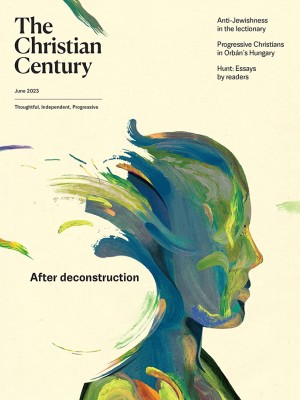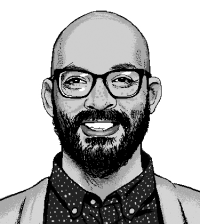Transformed by the dog I never wanted
She’s helping me answer the question, “Why this life instead of another?”

(Century illustration)
I did not want a dog. Life with almost-grown children and a quiet house seemed idyllic. Work early, long bike rides in the afternoon, a little art, long lunches with my spouse. Every so often she would ask about getting a dog and I would say no. Life was full and good.
But then something else started to grow. The quiet crept from peace to an almost scraping. I often kept the TV on most of the day just to feel like someone was there. And the house seemed so big now.
So when she asked again about getting a dog, a few months into COVID, I hemmed and nodded and thought, yeah, someday. Some life to fill the big, quiet house might be nice . . . someday. I was open now—and COVID soon created the space to bring in a puppy.
Read our latest issue or browse back issues.
As soon as our little bernedoodle puppy first toddled through our house, I was in love. I also grieved the quiet, the unencumbered bike rides, the mirage of a life of thinking and making. The vast expanse of time that became segments of walks, feeding, playing, working, being stared at to play, being herded to our room, sharing our bed with a living weighted blanket that seemed to always find the crook of our legs or get wrapped around our heads.
Each day the rhythm settled deeper, the mirage got farther away. The love of being joyously welcomed back after ten minutes in the basement began to fill all the spaces of what’s normal, of what happiness looks like.
On my first trip away after having the puppy for a year, I thought I’d be so excited for a good night’s sleep, for a day without a scheduled walk and work limited to two-hour work windows. But I couldn’t sleep—my legs kept searching for the weight, the warmth. I got up early and took a walk anyway, trying to keep myself from asking to pet every dog I passed.
How did I become this person? And how did I exist without a dog for so long? This was a different kind of feeling than life with a partner or kids, because I had always wanted to be married, always wanted to be a father. But this dog life was a surprise.
Sometimes it is not the ends that we dreamed of for years and years that most change us. Sometimes it’s the surprises, the tethers we ran from only to find they were always what we needed, that help us to find our truest selves, to find peace.
More and more, my walks with my dog prick a question my students have asked: Why? Why does a life with God matter? Why does this life matter if everything is about what happens after we die?
To be honest, this is a question that I have tamped down in my own faith from time to time, even as a person who believes in the consummation of all things, that the incarnate Word’s journey into us identifies with all of us who were and all who will be—that we are all in Christ, now and forever. Yes, that all will be, all are saved—but the question remains. What, then, is the point of this life?
God, why all this if we’re all going to be with you in the end? Why not just do what we want and enjoy what we want and then die?
I wake up to my dog’s joy that I am there, and I realize I am changed. What is life without her, without this creature to live life with? If she were to die tomorrow, would I feel relief that I could return to the mirage of the life I thought I was parched for? Then I am reminded of a craving for kimchi, soon du bu (Korean soft tofu soup), my partner’s laugh, and the ways the cherry blossoms all seem to open at once in one warm shout in April. God is in this life, too.
The newness of this animal in our life wasn’t just comfort or a little bit of joy. She was a point of transformation—of who I would be and what a whole life would look like. There are times when a little grief creeps in. Why had I not wanted this earlier? How much did I miss simply because I thought I knew what I wanted? But somehow the peace swamps the regret, and there is simply gratitude for what is.
It’s something like the parable of the laborers, the latecomers who were paid the same wage as those who came early. Maybe this is what is so hard to remember about Christian life: it’s not a wage earned or lost. The coin is the means to live life for a day without hunger, to buy a few pieces of fish and bread and gather around a table.
In the face of fewer and fewer people seeing church or God as a way of life, I wonder if we really need to fear for our institutions or even for God. Instead we might ask ourselves how we’ve changed for knowing her. How have our lives become richer in our contingencies and connections? How have the mirages faded and allowed us to see something present in our lives that is true?
Why this life? I suppose we can’t answer that for everyone. We can only hope for the surprise that awaits them, their grudging yes to a pandemic puppy. We can wait for our own surprise, too. And in this life, every day, there are ways of seeing how God abides. Each day that we cling to her in all of the myriad surprises, the membrane between time and eternity stretches a little thinner.






